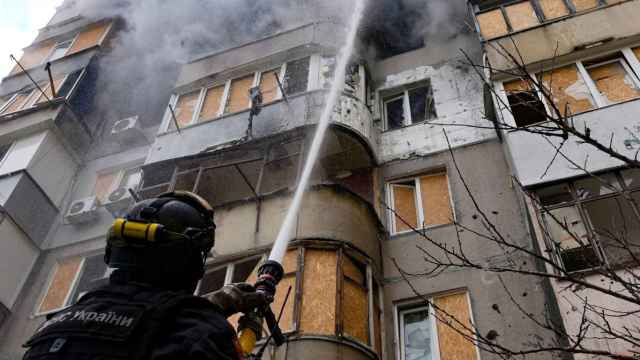Russian investment group Summa has bought out the world's largest oil trader as a partner in a firm building a terminal at the Dutch port of Rotterdam, which could damage its plan to establish Urals crude as a market benchmark.
Russian authorities and Summa want the planned terminal to provide a more readily tradable reservoir of Urals crude as they try to establish it as an alternative benchmark to North Sea Brent crude.
Summa said Wednesday that it had bought the 25 percent that it did not already own in Shtandart TT BV, the operator of the $1 billion project, from VTTI, an affiliate of top oil trader Vitol. A spokesman declined to disclose financial details.
Analysts had seen the backing of Geneva-based Vitol as vital to the project. Without it, Summa may struggle to get the kind of volumes needed. The investment group may also face a challenge from state-owned oil company Rosneft to take control of the project, industry sources said.
Vedomosti said VTTI — a 50/50 venture between Vitol and Malaysian shipping company MISC Bhd, an arm of state oil firm Petronas — quit the project because it was unable to secure control of the joint venture.
"Although the decision was based on a combination of factors, the most important factor is that VTTI is entering into a high-investment phase, stemming from an ambitious global growth strategy. Within this context, VTTI has decided to give priority to other opportunities," a VTTI spokesman said.
To secure a benchmark status for Urals, Russia needs to supply ample and steady volumes of the blend, which has not been the case so far, traders say.
Urals is typically sold at a discount to benchmark North Sea Brent crude, a disadvantage long questioned by President Vladimir Putin. Most Urals cargoes are sold via long-term contracts, which are based on price estimates that last weeks or months.
The planned terminal was initially expected to handle 40,000 barrels per day of crude oil and 20,000 bpd of oil products starting from 2015, but industry sources said the timetable was unrealistic after the project had already been dogged by delays.
Meanwhile, Russia's top oil producer Rosneft has been in talks with Summa to enter the project, the sources said.
A Rosneft spokesman declined to comment.
Rosneft recently acquired Morgan Stanley's oil trading unit, in a signal that it is keen to profit from its own trading after selling oil for years via international energy companies such as BP or trading houses such as Vitol and Gunvor.
A Message from The Moscow Times:
Dear readers,
We are facing unprecedented challenges. Russia's Prosecutor General's Office has designated The Moscow Times as an "undesirable" organization, criminalizing our work and putting our staff at risk of prosecution. This follows our earlier unjust labeling as a "foreign agent."
These actions are direct attempts to silence independent journalism in Russia. The authorities claim our work "discredits the decisions of the Russian leadership." We see things differently: we strive to provide accurate, unbiased reporting on Russia.
We, the journalists of The Moscow Times, refuse to be silenced. But to continue our work, we need your help.
Your support, no matter how small, makes a world of difference. If you can, please support us monthly starting from just $2. It's quick to set up, and every contribution makes a significant impact.
By supporting The Moscow Times, you're defending open, independent journalism in the face of repression. Thank you for standing with us.
Remind me later.





